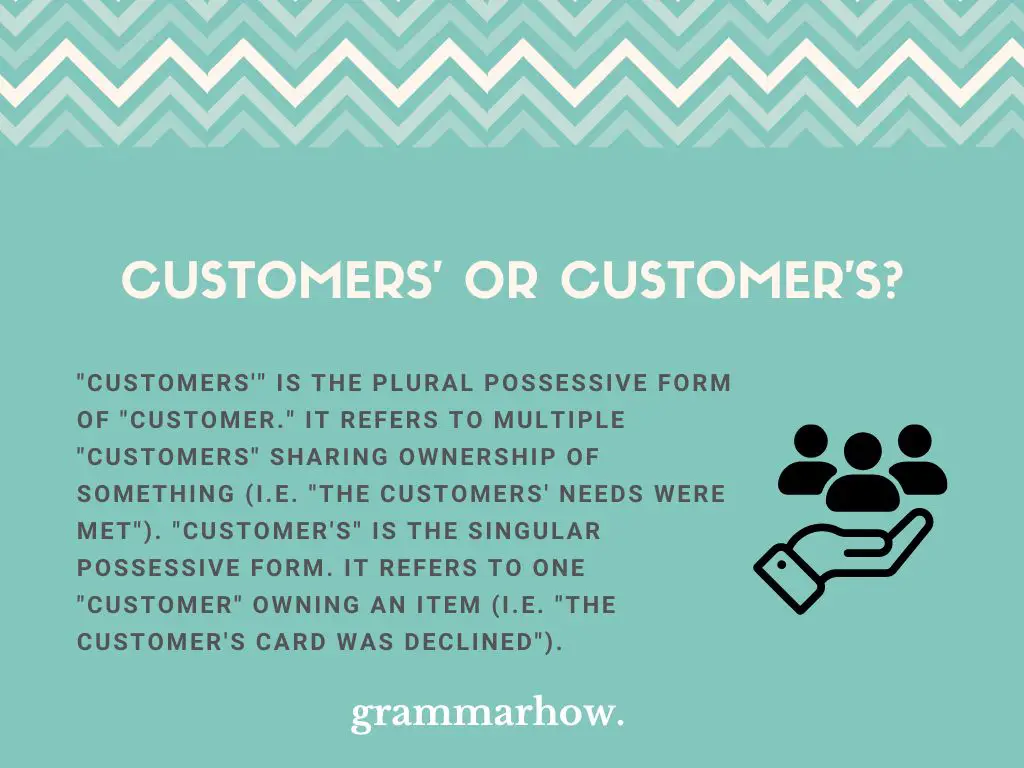Different words’ singular and plural possessive forms can be confusing at first glance. Most possessive forms follow standard rules, but it helps to run through them individually until you get them right.
This article will look at the possessive form of “customer.”
Customers’ or Customer’s?
“Customers'” is the plural possessive form of “customer.” It refers to multiple “customers” sharing ownership of something (i.e. “the customers’ needs were met”). “Customer’s” is the singular possessive form. It refers to one “customer” owning an item (i.e. “the customer’s card was declined”).

Check out the following to learn the different forms of “customer:”
| Singular | Customer |
| Plural | Customers |
| Singular possessive | Customer’s |
| Plural possessive | Customers’ |
The rules are fairly simple when you break them down into their core parts.
To create the singular possessive form, you need to add an apostrophe and an “s” to the singular form (customer). This turns “customer” into “customer’s” when one customer owns an object.
The plural possessive form comes from the plural form (customers). Since there’s already an “s” in the plural form, you only need to add an apostrophe at the end of the noun. This turns “customers” into “customers’.”
Customers’
“Customers'” is the plural possessive form. You should use it when more than one “customer” owns an object or group of similar objects. The object usually comes directly after “customers'” when it’s written this way.
You should use this form when it talking about more than one “customer” owning something. For example:
- Most of the customers’ orders have been completed. What else do you want us to do?
- We’re going to need these customers’ signatures if we’re going to sign off on these problems.
As you can see, “customers'” is great to use when many people own the same item.
Customer’s
“Customer’s” is used when one customer owns an object in your writing. It is the singular possessive form, meaning that only one person can own something.
It doesn’t have to be a tangible or physical item, either. You may say “customer’s needs” or “customer’s request” when using it in this form.
Here are some examples to help you figure it out:
- The customer’s request is a strange one. I think we’ll be able to fulfil it, though.
- I’m not sure the customer’s needs have been met. You need to work harder to get that to happen.
Customers
“Customers” isn’t a possessive form at all. The plural form refers to more than one “customer,” which is what “customers” achieves. Since there is no apostrophe present in the word, you cannot use it as a possessive form.
“Customers” only works for multiple customers in your writing (with no ownership or possession):
- Six customers have come through the doors since we opened.
- I’m not sure the feedback from the customers is going to go down well. Have you read it?
Conclusion
“Customer” is the singular form, meaning that an “‘s” at the end turns it into the singular possessive form with “customer’s.” You should use this when only one customer or person owns an object.
“Customers” is the plural form, meaning that an apostrophe turns it into the plural possessive form with “customers’.” This refers to more than one person owning an object.

Martin holds a Master’s degree in Finance and International Business. He has six years of experience in professional communication with clients, executives, and colleagues. Furthermore, he has teaching experience from Aarhus University. Martin has been featured as an expert in communication and teaching on Forbes and Shopify. Read more about Martin here.
